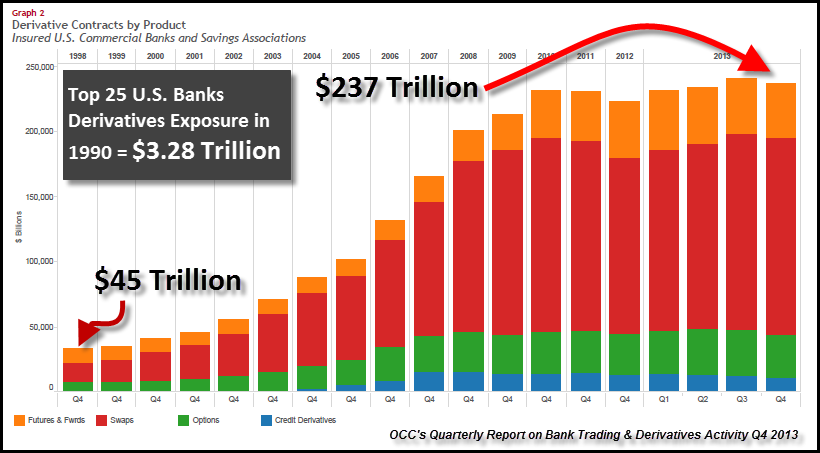Banks Face New Checks on Derivatives Trading
Post on: 2 Апрель, 2015 No Comment

By Ben Protess January 3, 2013 11:07 am January 3, 2013 11:07 am
After spending two years and millions of dollars to temper a regulatory crackdown, the world’s biggest banks are now resigned to a wave of new oversight.
By New Year’s Eve, 65 banks had registered their derivatives business with regulators and turned over heaps of real-time trading data to outside warehouses, fulfilling a central rule of the Obama administration’s financial regulatory overhaul. Late on Wednesday, a warehouse also posted an early batch of data online, shining a rare spotlight on an opaque business that blew up in the 2008 financial crisis.
The changes, regulators say, signal a pivotal moment in the fight over Wall Street regulation. Until now, regulators had little authority and little information to scrutinize the minutiae of derivatives trading, a vast market that totals more than $600 trillion.
They are an historic change for the markets that will benefit the public and the economy at large, Gary Gensler, chairman of the Commodity Futures Trading Commission, the architect behind the derivatives overhaul, said in a statement.
The banks required to register and produce data this week included overseas giants like Deutsche Bank in Germany and Barclays in England as well as some of the biggest names on Wall Street, among them Goldman Sachs, Citigroup, Morgan Stanley and JPMorgan Chase. The group signed up as so-called swap dealers, the designation for firms that arrange derivative contracts tied to the value of commodities, interest rates or mortgage securities.
The new oversight is a major component of the Dodd-Frank Act, the Wall Street regulatory overhaul passed after the financial crisis. The law took particular aim at derivatives, which proved pernicious in the crisis.
Banks had bought billions of dollars in derivatives as dubious insurance on mortgage-backed investments. When the investments soured, the American International Group lacked the capital to honor agreements with the banks, prompting a $180 billion government bailout of the giant insurance company.
Hoping to prevent such calamities, lawmakers spelled out a plan in Dodd-Frank to require derivatives dealers to register with Mr. Gensler’s agency. Under the law, the banks and hedge funds must also open up their trading books to regulators and the broader public.
The oversight, carried out through new rules written at Mr. Gensler’s agency, developed in fits and starts. At times, a plan that was supposed to kick in during 2011 seemed like it might never take effect.
The delay was in part a result of an aggressive lobbying campaign on Wall Street, which dispatched lawyers and lobbyists to temper the overhaul. In turn, Mr. Gensler’s agency conceded modest changes and postponed the oversight for several months.
In one victory for the derivatives industry, regulators agreed to apply the swap-dealer designation only to firms that arrange more than $8 billion worth of swaps contracts annually, up significantly from an initial proposal of $100 million. The plan could excuse some energy companies and large regional banks from registering.
Even so, the rule still captured the biggest banks in the world, requiring them to register as swap dealers by Dec. 31 of last year. The designation requires that banks, among other things, adopt internal risk management controls, bolster disclosures to trading partners and meet certain record-keeping requirements.
The banks must also turn over in real-time the data from their trading book. The disclosures, posted on the Web site of the Depository Trust and Clearing Corporation, a data warehouse, include the volume, time and price of each derivatives trade. The trades involve interest rate swaps and credit indexes, including the index where JPMorgan Chase suffered its recent multibillion-dollar trading loss.
The spreadsheet, regulators say, presents the public with its first window into the swaps market. While the public is blocked from viewing the identity of the trader, regulators have access to that information.
“Real-time reporting brings transparency to the formerly opaque swaps market,” Mr. Gensler noted.














